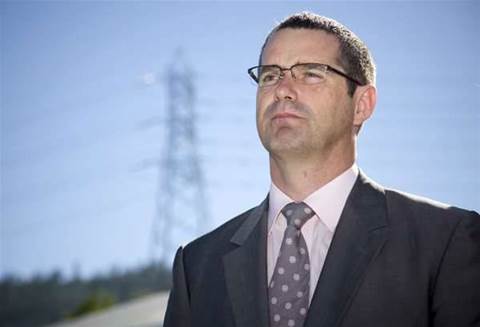Communications Minister Stephen Conroy has succeeded in having a raft of Government-proposed amendments to the NBN Companies bill approved despite mounting frustration from opposition senators.
The debate over amendments to the NBN Companies Bill continued until 10pm last night before being adjourned until today, after the Government won an extension to the sitting of both houses of parliament.
Parliament had been due to break last night until the Federal Budget in May, but was forced to re-sit after the Government revealed 23 pages of last-minute amendments to its NBN Companies and Access bills.
Utility exemptions
In an extended session where frustrations on all sides were apparent, the Government succeeded in having amendments 2 to 16 to the Companies Bill passed - which would allow utilities and other organisations to take a direct wholesale service from NBN Co.
That forced Liberal Senator Simon Birmingham to withdraw almost all of the Coalition's proposed amendments in that area (including 6A, B, C, G, L, M and R).
NBN Co service limits
Senator Birmingham attempted to have amendment 6S - which would legislate limits to the types of services NBN Co could supply - passed, only to see it defeated by two votes.
Debate on 6S was temporarily derailed by Queensland LNP Senator Barnaby Joyce, who sought information on NBN Co's planned borrowings, who would pay "if it falls over", and why it was building fibre-to-the-premise instead of fibre-to-the-node.
Conroy rebuffed Joyce twice before asking the questions be ruled "out of order".
"I'm not going to waste the Chamber's time," Conroy said.
"The information you're seeking is publicly available. It has been litigated many times in this chamber. None of your questions are relevant to the bill."
A division was required for the vote on 6S.
"Division. Ring the bell for four minutes," the deputy chair said. "Bells," she then corrected after some inaudible muttering. "Whatever." It was still only 8.45pm.
Layer 2 limit
The Government achieved passage of two minor amendments (17 and 18) to the section of the bill on functional separation, before Senator Birmingham attempted to legislate NBN Co to operate no higher than Layer 2 in the OSI model.
The Layer 2 limit was again defeated - but not before some rare signs of agreement in the chamber.
Rather than legislate a Layer 2 limit, which Conroy said "could be inflexible", the Government intended to "consider placing" such limits on NBN Co's carrier license within the next 12 months.
"This is one of the rare instances where the Coalition and the Government aren't too far apart," Greens Senator Scott Ludlam noted.
"Their intentions are the same".
Conroy had asked Senator Birmingham to withdraw the proposed amendment given the Government's plans to impose such a limit in the carrier license.
"The Coalition welcomes that commitment," Birmingham replied. "We note it, we bank it and look forward to seeing in honoured.
"But the opposition does believe our amendment does still have value and we believe that to be the case largely because we're approaching this from an issue of precaution.
"We think it is better and more sensible to ensure risks are minimised; that doors are closed in a sense rather than being left ajar. If the Government then needs to open the door a little and find space for extra flexibility then we can do that, but to start with, parliament needs to ensure this entity [NBN Co] is living by the principles the Government has set out."
The amendment was defeated.
More work for NBN Co
Conroy also managed to achieve passage of Government amendment 19, which extended the completion of the NBN from "30 June 2018" to "31 December 2020".
He argued the shift was necessary because of the extra work NBN Co had taken on since the bill was first drafted - with 93 percent of homes now in line to receive a fibre connection (up from 90 percent), and NBN Co now responsible for rolling out fibre in new housing estates.
"The legislation is just catching up with the NBN Corporate Plan," Conroy said.
But he came under heavy fire from Senators Mary Jo Fisher and Ian Macdonald, who argued the delay was disproportionate to the amount of extra work.
"You're extending an eight-year plan to a 9.5-year plan, so it's an extra 1.5 years," Fisher said.
"But 1.5 over 8 does not make three percent. That doesn't really equate to me, Minister, even taking into account the greenfields sites.
"Can you explain why there's a sevenfold increase [in time needed] instead of three percent?"
Conroy responded that the combination of new housing estates and the extra three percent of fibre connections required that length of time.
Debate on the bills was adjourned and expected to continue today.





_(21).jpg&h=142&w=230&c=1&s=1)


.png&h=142&w=230&c=1&s=1)




.jpg&w=100&c=1&s=0)











